BETTER BE ON YOUR AVANT-GARDE
Have you ever eaten at a new restaurant and summed it up thusly?: “I have no idea what I just ate! It was a little tough to chew and digest, but the presentation was thrilling and I loved the flavors. For what you get, the fare was reasonably priced, too. Ultimately, although I ate WAY too much and was overly-satiated by meal’s end, I’m glad I went and can honestly say that I liked it.” Then the afterthought. “But I’m not sure if, or to whom, I can recommend it with unadulterated certainty.” So you call a friend and say, “I can’t truly describe whatever-the-hell it was that I just consumed, so I don’t even know if you have a taste for that sort of thing, but, yeah, I liked it. So, um, if you’re into something that is indescribably like nothing you’ve ever eaten before, sure, go. Would I recommend it?” Pause. “I have to go to the bathroom.”
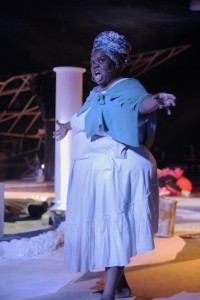 Welcome to Crescent City, a “hyper-opera” which opened at Atwater Crossing last weekend. Equal parts opera, avant-garde, art installation and phantasmagoria, the result, if you can handle it, is a jaw-dropping, perplexing, exciting, numbing, fun, challenging, watchable, incoherent, exasperating, noteworthy, and exciting theatrical experience the likes of which you may never see again.
Welcome to Crescent City, a “hyper-opera” which opened at Atwater Crossing last weekend. Equal parts opera, avant-garde, art installation and phantasmagoria, the result, if you can handle it, is a jaw-dropping, perplexing, exciting, numbing, fun, challenging, watchable, incoherent, exasperating, noteworthy, and exciting theatrical experience the likes of which you may never see again.
At intermission, my three companions had the exact same comment: “I like it’¦but what’s happening?” The louse that caused their collective head-scratching was born out of obscure storytelling: In Douglas Kearney’s libretto, a hurricane has hit the town of Crescent City and another appears imminent. Voodoo Priestess Marie Leveau emerges from her tomb to summon the Loa (voodoo gods) to aid her beloved city. Oh, and there’s a Brechtian drag queen, coke-snorting nurses, a ghost cop, a Homesick Woman, and a Good Man, all of whom may or may not be possessed. Toss in some revelers and freaked-out specters, and you’ve got’¦well, I don’t know what you’ve got.
In a 25,000 square-foot warehouse are six playing areas, each created by different artists (“hospital,” “cemetery,” “junk heap,” et al). Theatregoers watch from the perimeter (either free-standing, walking around or seated), from the center of the action (on choicely-placed bean bags), or from above (on a small ledge). While it’s grand to have bizarre revelers and grand opera singers perform in your face, don’t expect comfort.
Live and pre-recorded video images are projected among supertitles onto four screens – a trippy effect, fascinatingly staged, until it becomes clear that (a) it’s physically exhausting to figure out where to look and when, and (b) the lyrics don’t elucidate the goings on very well. By the end of the night, patrons who had excitedly perambulated the perimeter were now sitting on the ground with zombie-like stares.
Director Yuval Sharon states in the program notes, “Hyperopera to me means an aesthetic of potentiality, or a see-sawing state between multiple possible meanings.” If you can define what the uber-creative Sharon means in this sentence, you should love Crescent City, because it’s basically Opera of the Absurd, a world where pursuing meaning is a futile attempt. But that’s the thing about avant-garde, and why it retains a fractional appeal in the arts world: if you can understand the intentions and meaning behind an avant-garde project, the creators will no doubt hurl themselves from the roof of a museum, screaming, “Why does everyone understand me?”
Musicologist’s will adore the orchestrations (which include standard instruments along with a chromelodeon, a saw, and electronica playback) and the way that composer Anne LeBaron stretches the boundaries of Opera to new heights. The term “hyperopera” was coined by LeBaron, whose music contained such fascinating ornamentation that I was dying to see how it was achieved; it’s a shame that the huge orchestra was hidden from view.
Opera fans will slather high praise upon the ridiculously talented and unique singers: the remarkably resonant contralto Gwendolyn Brown, the profoundly rich bass baritone Cedric Berry, silvery sopranos Maria Elena Altany and Ji Young Yang, and the remarkable tenor Timur Bekbosunov.
Fans of modernism will feast on the otherworldly enormousness of it all. Bohemians will appreciate the art-for-art’s-sake aspect of what is an intriguing and amazing, but difficult and inaccessible opera. Theater directors and technicians will drool over the multi-media effects and ingenious staging.
And if you’re a stoner, the much-needed marijuana brownie you consumed prior to the show should kick in just as you’re losing interest.
photos by Dana Ross
Crescent City: a hyperopera
presented by The Industry at Atwater Crossing in Glendale
scheduled to end on May 27, 2012
for tickets, visit http://theindustryla.org
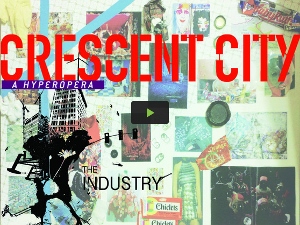
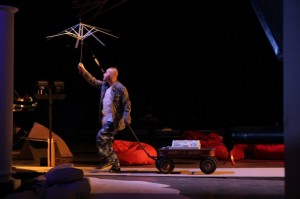
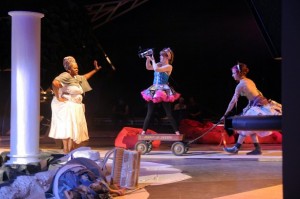
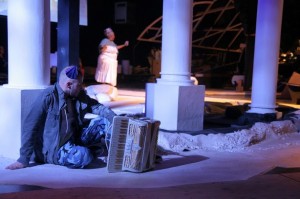
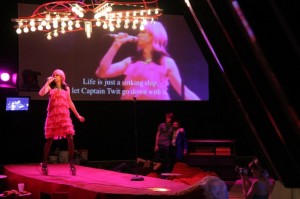
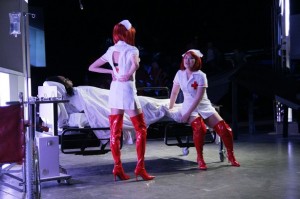
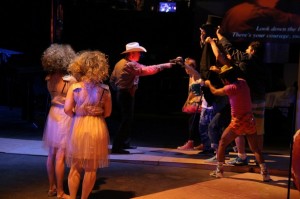

{ 1 comment… read it below or add one }
Ooh, wish I had read the last line of your review before I saw it!